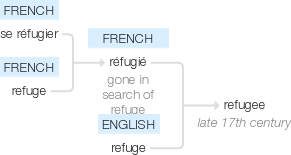Refugee
late 17th century: from French réfugié ‘gone in search of refuge’, past participle of ( se) réfugier, from refuge (see refuge).
wiktionary
From French réfugié, past participle of réfugier(“to take refuge”), describing early French Protestants seeking refuge after the Edict of Fontainebleau in 1685. Analyzable as refuge + -ee.
etymonline
refugee (n.)
1680s, "one who flees to a refuge or shelter or place of safety; one who in times of persecution or political disorder flees to a foreign country for safety," from French refugié, a noun use of the past participle of refugier "to take shelter, protect," from Old French refuge "hiding place," from Latin refugium "a taking refuge; place to flee back to," from re- "back" (see re-) + fugere "to flee" (see fugitive (adj.)) + -ium , neuter ending in a sense of "place for."
In English, the word was first applied to French Huguenots who fled persecution in their native country after the revocation (1685) of the Edict of Nantes. The word meant "one seeking asylum" until 1914, when it evolved to mean "one fleeing home" (first applied in this sense to civilians in Flanders heading west to escape fighting in World War I). In Australian slang from World War II, reffo.
